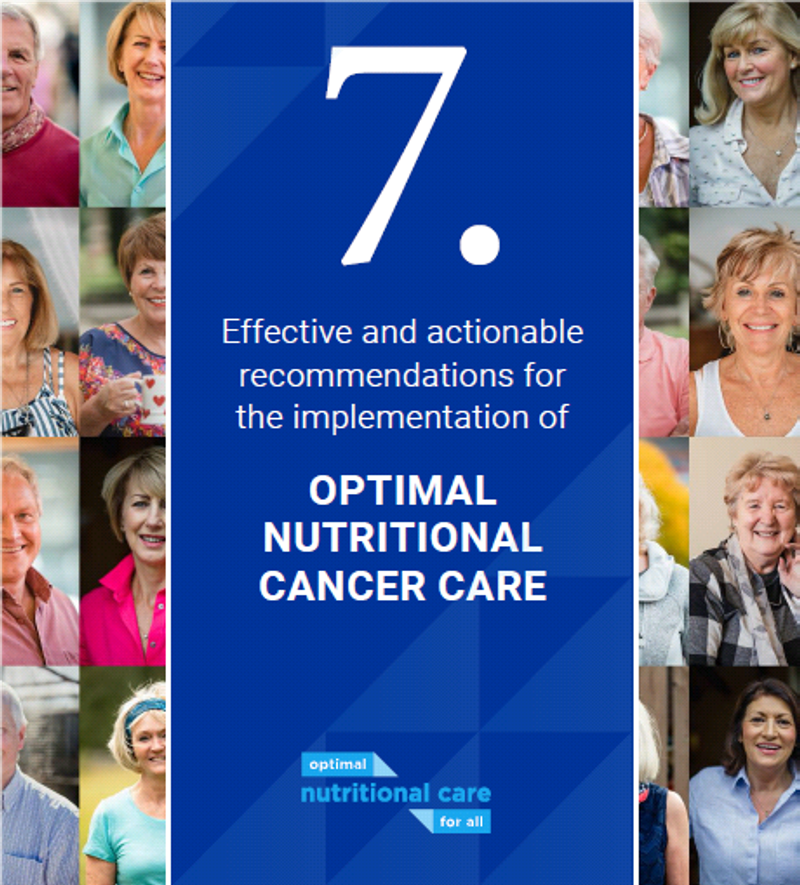
Posted on: September 14, 2021
European expert groups launch urgent plan for optimal nutritional care for all cancer patients at ESPEN Congress 2021
At a joint policy seminar held yesterday by the Medical Nutrition International Industry and Optimal Nutritional Care for All campaign , renowned European expert groups urged immediate action to make nutritional care mandatory in cancer care, as part of a series of policy recommendations in their ‘Optimal Nutritional Cancer Care’ report published as part of the seminar.
Professor Laviano, Associate Professor of Internal Medicine in Rome stated that early nutrition support can enhance the efficacy of anti-cancer treatments and improve outcomes, including survival and quality of life.
The report stresses the vital importance of nutrition for treatment and quality of life of patients with cancer and calls upon stakeholders to join forces to implement optimal nutritional care for all cancer patients and throughout their cancer journey, with 7 actionable recommendations.
A poor nutritional status can worsen treatment outcomes, cause patients to suffer avoidable complications and reduce their quality of life. It is estimated that the deaths of 10-20% of cancer patients can be attributed to malnutrition rather than to the malignancy itself.
Yet, in studies, only 30%-60% of patients found to be at risk of malnutrition received nutritional support. The cost of malnutrition in cancer care in the EU amount to €17B per year.
Recognising the need for every EU member state to take coordinated actions for Europe’s Beating Cancer Plan implementation, this joint call to action includes 7 key recommendations designed to ensure the protection of the nutritional status of patients with cancer.
The report recommends:
• The right to high-quality cancer care and medicines must explicitly apply to optimal nutritional care.
• Measuring and monitoring nutritional and metabolic status should be systemised and reviewed as a standardised part of the multidisciplinary team (MDT) processes.
• Development of a standardised framework for nutrition education and training, extended to all those involved in cancer care currently and in the future.
• All multidisciplinary teams should include a specialist oncology dietitian
• All member state authorities should establish a nutrition steering group linked to comprehensive cancer centres.
• Research funding should be allocated to identify effective implementation strategies for integrating optimal nutritional care into cancer care.
• Cancer patients should have timely access to information and resources regarding nutrition, diet, and nutritional therapies relevant to their disease type and stage.
High-quality care cannot be delivered without fully integrating nutritional care into the cancer care pathway, from diagnosis through the entire disease trajectory. All European countries are being urged to incorporate these essential recommendations in national cancer strategies and all relevant national and local health and healthcare policies.
“Nutritional care is a vital ‘supportive’ treatment for cancer, which ensures that patients are in the best possible condition to benefit from advances in oncology treatments’. Nicole Erickson, member of the EFAD oncology expert advisory board, highlighted the fact that many patients with serious nutritional problems do not have access to dietetic advice: ‘and therefore multidisciplinary teams should include a specialised oncology dietitian’.
Supporting the plan, Declan O’Brien, BSNA Director General commented:
“Cancer-related malnutrition often remains underdiagnosed and undertreated in current clinical practice with at least 1 in 3 cancer patients becoming malnourished.
It is essential that cancer patients are screened for nutritional status and receive information on nutritional interventions that can help them as they go through their cancer treatment. There are valuable recommendations in this report, for the UK as well as European countries, and we urge UK policy makers to reflect them in cancer clinical pathways for all patients.”
More information and the report can be found here: https://medicalnutritionindust...
List of the organisations as co-authors of the report:
- ESPEN is the European Society for Clinical Nutrition and Metabolism www.espen.org
- ENHA is the European Nutrition for Health Alliance (ENHA) is a charity established to promote and implement nutritionalrisk screening and improve nutritional care for all European citizens. www.european-nutrition.org/enha
- ONCA is the Optimal Nutritional Care for All (ONCA) campaign, and is a multi-stakeholder initiative to facilitate greater screening for risk of disease-related malnutrition/undernutrition and nutritional care implementation across Europe. www.european-nutrition.org
- MNI is the Medical Nutrition International Industry (MNI) is the voice of the medical nutrition industry at international level. MNI is dedicated to advancing better care through better nutrition,across all ages and healthcare settings. www.medicalnutritionindustry.com
- ECPC is the largest European cancer patients’ association. Covering all 28 Member States, and many other European and non-European countries, the ECPC represents those affected by all types of cancers, from the rarest to the most common. www.ecpc.org
- EFAD is the European Federation of the Associations of Dietitians (EFAD) was established in 1978. www.efad.org
- ECO is the European Cancer Organisation aims to reduce the burden of cancer, improve outcomes and the quality of care for cancer patients, through multidisciplinarity and multiprofessionalism. www.european-cancer.org